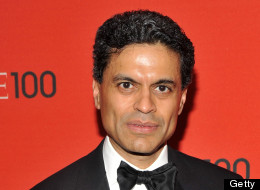Fareed Zakaria apologizes for plagiarism - POLITICO.com:
Fareed Zakaria apologizes for plagiarism
Time Magazine columnist and CNN host Fareed Zakaria has apologized "unreservedly" to Jill Lepore for plagiarizing her work in The New Yorker.
"Media reporters have pointed out that paragraphs in my Time column this week bear close similarities to paragraphs in Jill Lepore's essay in the April 22nd issue of The New Yorker. They are right," Zakaria said in a statement to The Atlantic Wire. "I made a terrible mistake. It is a serious lapse and one that is entirely my fault. I apologize unreservedly to her, to my editors at Time, and to my readers."
Zakaria's column about gun laws for Time's August 20 issue includes a paragraph that is remarkably similar to one Jill Lepore wrote in April for a New Yorker article about the National Rifle Association. (The similarities were first flagged by NRANews.com and first reported by Tim Graham of the conservative watchdog group Newsbusters, who leveled the plagiarism charge.)
From Lepore's New Yorker article:
As Adam Winkler, a constitutional-law scholar at U.C.L.A., demonstrates in a remarkably nuanced new book, “Gunfight: The Battle Over the Right to Bear Arms in America,” firearms have been regulated in the United States from the start. Laws banning the carrying of concealed weapons were passed in Kentucky and Louisiana in 1813, and other states soon followed: Indiana (1820), Tennessee and Virginia (1838), Alabama (1839), and Ohio (1859). Similar laws were passed in Texas, Florida, and Oklahoma. As the governor of Texas explained in 1893, the “mission of the concealed deadly weapon is murder. To check it is the duty of every self-respecting, law-abiding man.
From Zakaria's Time Magazine column:
Adam Winkler, a professor of constitutional law at UCLA, documents the actual history in Gunfight: The Battle over the Right to Bear Arms in America. Guns were regulated in the U.S. from the earliest years of the Republic. Laws that banned the carrying of concealed weapons were passed in Kentucky and Louisiana in 1813. Other states soon followed: Indiana in 1820, Tennessee and Virginia in 1838, Alabama in 1839 and Ohio in 1859. Similar laws were passed in Texas, Florida and Oklahoma. As the governor of Texas (Texas!) explained in 1893, the "mission of the concealed deadly weapon is murder. To check it is the duty of every self-respecting, law-abiding man."
In its initial statement earlier today, Time Magazine said it "takes any accusation of plagiarism by any of our journalists very seriously, and we will carefully examine the facts before saying anything else on the matter."
UPDATE (4:22 p.m.): A Time Magazine spokesperson emails:
TIME accepts Fareed's apology, but what he did violates our own standards for our columnists, which is that their work must not only be factual but original; their views must not only be their own but their words as well. As a result, we are suspending Fareed's column for a month, pending further review.
This post has been updated to include Zakaria's comment.
'via Blog this'
---
http://www.huffingtonpost.com/2012/08/10/fareed-zakaria-plagiarism-new-yorker-time_n_1764954.html

Time editor-at-large and CNN host Fareed Zakaria was suspended from both places for a month on Friday after admitting to lifting parts of a story from the New Yorker.
Conservative media watchdog Newsbusters was the first to spot the similarities between a Zakaria piece on gun control and an article by Jill Lepore that appeared in the New Yorker in April.
---
The Associated Press
NEW HAVEN, Conn. (AP) -- A journalist recently accused of plagiarism has resigned from his position on Yale University's governing board to better focus on his work.
The New Haven Register reports (http://bit.ly/OIHJP3) that in a letter to Yale President Richard Levin, Fareed Zakaria said he needed to shed some of his responsibilities as he re-examines his professional life.
Levin thanked Zakaria for his time and service.
Paul McCain published another deceptive, copied post on November 11th -
The citation first read "source" at the bottom of the full article. Now it says Source: Catholic Cyclopedia.
That must be a co-inky-dink, that he changed it so fast. However, that does not spare him from the charge of plagiarism. The post is set up to look like he wrote it, with no indication on the main page that Roman Catholics wrote it for them.
As I wrote many times before, a citation at the end says, "I wrote the entire article, but I used this source as my research."
Here are references provided by the Church of Rome for publishing the article -
***
GJ -
That must be a co-inky-dink, that he changed it so fast. However, that does not spare him from the charge of plagiarism. The post is set up to look like he wrote it, with no indication on the main page that Roman Catholics wrote it for them.
As I wrote many times before, a citation at the end says, "I wrote the entire article, but I used this source as my research."
Here are references provided by the Church of Rome for publishing the article -
About this page
APA citation. (1910). St. Martin of Tours. In The Catholic Encyclopedia. New York: Robert Appleton Company.Retrieved November 15, 2012 from New Advent: http://www.newadvent.org/cathen/09732b.htm
MLA citation. "St. Martin of Tours." The Catholic Encyclopedia. Vol. 9. New York: Robert Appleton Company, 1910. 15 Nov. 2012 <http://www.newadvent.org/cathen/09732b.htm>.
Transcription. This article was transcribed for New Advent by Michael C. Tinkler. In honor of the Societas Sancti Martini Episcopi Turonensis at Emory University.
Ecclesiastical approbation. Nihil Obstat. October 1, 1910. Remy Lafort, Censor. Imprimatur. +John M. Farley, Archbishop of New York.

